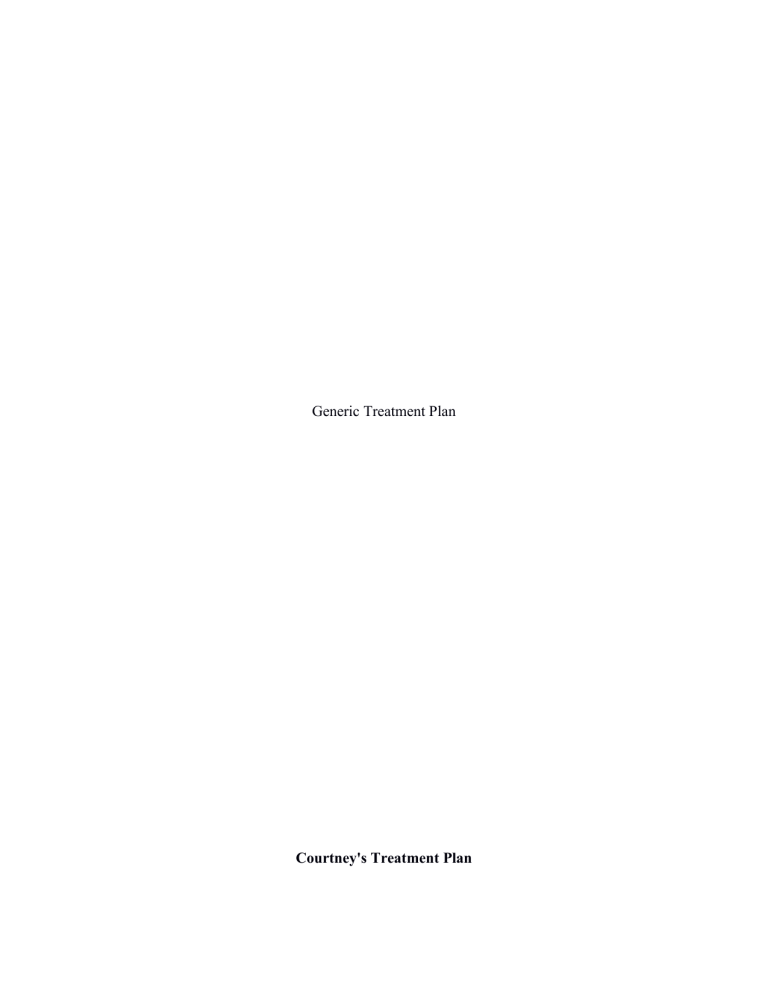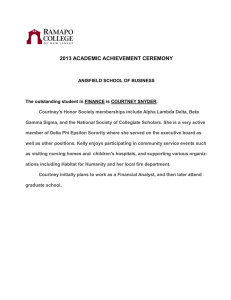Courtney's Treatment Plan: Antisocial Personality Disorder & PTSD
advertisement

Generic Treatment Plan Courtney's Treatment Plan (I) Individual While I am also a Caucasian female, I grew up in a stable, two-parent home, in a lower to a middle class, rural setting, which is different from Courtney’s experiences. Having experienced a sexual assault at 4 1/2, and again at 22, I can see how her step-father's violent, sexual-abuse has profoundly impacted her life. It is possible she has PTSD and does not know it. While I have compassion for Courtney, I also see the rigid thinking of "take care of me only" perspective mixed with the "at all costs attitude" as an overriding theme in her life. I am wary of her recent desire to want to move to the psychiatric ward. My gut instinct is to vet out my suspicions of deceitfulness while also maintaining an appropriate "I am for you" stance as her therapist. Antisocial personalities can con others for personal gain, and I must make sure I do not convey that I suspect anything through managing countertransference. (C) Contextual Assessment Courtney is a Caucasian, twenty-four-year-old woman who is serving a twenty-year sentence for murder at a maximum-security prison. She has been in prison previously on an assault charge. She recently attempted suicide by cutting her arms with a razor. She is requesting a transfer to the prison's psychiatric ward. However, in the last year, she has been involved in three fights and instigated a riot. Courtney is in Erickson's stage of young adulthood, whereby her ego development can be either intimacy and solidarity or isolation. She becomes aggressive when she feels inferior. Her companionship and relationship skills need development and priority over self-seeking actions. Other details: Sexually assaulted by step-father at ages 10-12 years old Mother denied assaults, called Courtney a liar, “women are less valuable” Courtney has two children she has rarely cared for Relationships with men characterized as violent, physical altercations Courtney exhibits irritable, aggressive mood, trusts no one, no remorse or empathy “Blatant disregard for authority” Taking GED class and attending religious service on Saturday Charming and personable on occasion Based on Courtney's constellation of presenting behaviors, I keep her in her current location as long as she is not able to carry out suicidal intent. Therefore, I defer to the rules and regulations of the state. Townsend Model Assessment: Personal: Emotionally- immature, reactive, irritable mood, angry, Behaviorally- violent, aggressive, combative, assault history, lack of remorse, occasionally personable, charming People (vulnerable relationships): Terri (that is questionable) Performance (tasks of life): not taking responsibility for her two children, in prison for 13 years (A) Assessment & Diagnosis Diagnosis- Antisocial Personality Disorder 301.7 (F60.2) Posttraumatic stress disorder (PTSD) assessment (will occur at the initial session), Depression Inventory (will occur at the initial session), and Suicide Inventory will occur on a weekly basis, and self-injury assessment will occur every week. N) Necessary Level of Care Outpatient, individual sessions (three times per week) Optional Mentalization Based Outpatient Group therapy (two times per week) * I am going to recommend that Courtney attend group therapy. However, I would like to see her decide as to whether or not she will attend. (S) Strengths Self: Courtney is an independent, strong-minded individual who has had to fend for herself at a very young age. She is resourceful and resilient. Based on her school assessment, she is bright. Family: Courtney desires to reconnect with her children. Community: Prison mates, GED teacher/class, religious leader, therapist (T) Treatment Approach Schema therapy (ST) Dialectical behavior therapy (DBT) *Assess Schema treatment progress at one year mark. *Possible Eye movement desensitization reprocessing (EMDR) if warranted through confirmed assessment of PTSD, (A) Aim and Objectives of Treatment- Courtney will use her coping skills to not self-injure with zero self-harm and zero suicide attempts. She will engage in ongoing medical attention and wound care treatment. She will utilize at least two DBT skills (mindful meditation, distress tolerance, emotional regulation) 100% of the time when she has urges to self-harm. Courtney will actively commit to, and engage in the treatment process by attending all individual therapy sessions; she will adhere to all rules related to between-session conduct; she will be honest with her counselor; she will complete homework assignments such as: tracking mood and thoughts (at a minimum one entry daily), charting identifying triggers that lead to irritability and aggressive behaviors; she will do assigned homework with 100% compliance. Courtney will actively learn and participate in daily mindfulness, calming techniques (ST/CBT). She will apply these skills (observe non-judgmentally, live in the moment, experience emotions) to help her tolerate her negative thoughts. Courtney will be encouraged to attend mentalization based group counseling 2 times a week; yet she has the option of attendance. She will complete all daily mindfulness assignments out of class with 100% compliance. Courtney will use learned skills to regulate negative emotions. She will utilize at least one DBT emotional regulation skill (label emotions, reduce vulnerabilities, take opposite action,) 90% of the time to increase her ability to regulate strong negative emotions. Courtney will learn and apply the skills of distress tolerance by self-soothing and radical acceptance (DBT). The counselor will work with Courtney on building radical acceptance. Participation and homework with 100% compliance. Courtney will learn and apply interpersonal effectiveness skills by communicating what she needs, how to say no, and managing interpersonal conflict (DBT). She will utilize the schema therapy flash-cards as needed before or during a triggering event. The counselor will coach Courtney as to how to use this effectively. Compliance with homework is 100%. (R) Researched-Based Interventions/Treatments (based on Schema Therapy (ST), and Dialectical Behavioral Therapy (DBT). Counselor will structure the boundaries of the therapeutic process to help Courtney make progress. Self-awareness skills Mindfulness skills Emotional Regulation skills Distress Tolerance skills Interpersonal skills Schema processing skills This is the schedule for one year of therapy and to be assessed at the end of the year. (T) Therapeutic Support Services Medical attention and examination for physical health Psychiatric assessment for medication for presenting symptoms Exercise such as yoga Prison Fellowship Academy (if offered) Work GED classes Religious involvement


